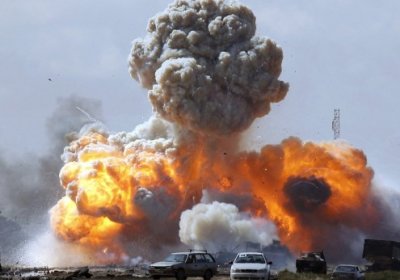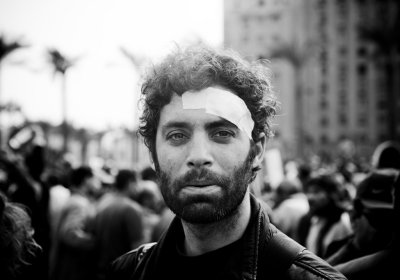A federal budget containing the largest single-year spending cuts in US history was grudgingly passed by Congress on April 14.
The cuts, amounting to US$38.5 billion, will be implemented until the end of the financial year on September 30, 2011.
President Barack Obama hailed the budget agreement as a victory. He said: “This is an agreement to invest in our country’s future while making the largest annual spending cut in our history.”
877
Two wars are being waged simultaneously in Libya. One has grown out of a revolutionary struggle for democracy. The other is an attempt by imperialism to strengthen its domination of the country.
Both wars appear to share the goal of “regime change”, but they stand at opposite ends of the political spectrum.
The regime change that the revolutionary struggle seeks to achieve is the overthrow of the Muammar Gaddafi dictatorship and the establishment of a system of democratic rule.
A life dedicated to creative non-violent resistance against the Israeli occupation of Palestine was cut short when Juliano Mer-Khamis was shot dead by unknown masked gunman in the West Bank town of Jenin on April 4.
Mer-Khamis was an Israeli citizen, born to a Jewish mother and a Palestinian Christian father.
In 2009, Mer-Khamis told Israeli army radio: “I am 100% Palestinian and 100% Jewish.”
At the time of his death, Mer-Khamis was just 52-years-old. He was a father and a husband.
Haiti finds itself with a president-elect with ties to the extreme right — thanks to a concerted effort by foreign powers to continue thwarting the social justice aspirations of the Haitian people.
President-elect Michel Martelly is closely associated with the forces that overthrew elected governments in 1991 and 2004.
He told Canadian Broadcasting Corporation (CBC) Radio’s The Current on April 7 that Haiti has been “going in the wrong direction for the last 25 years”.
The Euro-US attack on Libya has nothing to do with protecting anyone; only the terminally naive believe such nonsense.
It is the West’s response to popular uprisings in strategic, resource-rich regions of the world and the beginning of a war of attrition against the new imperial rival, China.
US President Barack Obama’s historical distinction is now guaranteed. He is the US’s first black president to invade Africa.
Much of the hysteria surrounding the support of Sydney’s Marrickville Council for boycott, divestment and sanctions (BDS) against Israel has focused on the comparison made by the global BDS campaign with the former apartheid system in South Africa.
Pro-Israel politicians and propagandists are quite aware of the power of the comparison. By describing a system where one part of the population has democracy and another doesn’t, it takes away Israel’s claim to legitimacy as a “Jewish democracy”.
The Bahraini government has ordered the dissolution of two opposition political parties. The move is part of its crackdown against the pro-democracy movement that broke out in February.
The al-Wefaq and al-Amal parties were ordered to dissolve for “threatening peace”. The order is in response to their involvement in the protests that called for the removal of the Khalifah royal family, which has ruled the country for more than 200 years, the April 14 Washington Post said.
The question of refugees "is as fundamental a human rights issue as there is", former senator and refugee campaigner Andrew Bartlett told a rally of around 100 in Brisbane on April 9. The rally was organised by the Refugee Action Collective (RAC).
Bartlett said refugees "are among the most vulnerable people on Earth. Forcing them to return home to danger is effectively sending them to their deaths.”
Richard Seymour (“Libya: Spring time for NATO”, GLW #876) has done an admirable job debunking justifications of “humanitarian” wars and its defenders. But his analysis of the internal dynamics of Libya leads him astray — so much so that bold assertions are taken as facts with nothing to back it up.
He says the co-option of the Libyan revolution by NATO is a victory for reaction. Then he says it is no good hoping that the militias will shake themselves free of such constraints if they take power.
In the early morning of April 9, new battles broke out on the streets of Cairo. Protesters fought back against mass repression carried out by the army, leading to two deaths.
In a fresh victory for people’s power in Egypt, protesters defeated the crackdown.
Protesters were demanding former dictator Hosni Mubarak and all corrupt officials from his regime be charged. Protesters remained in Cairo’s Tahrir Square late into the night before the army moved in.
Only days before Peru’s general elections on April 10, three protesters were killed and dozens injured by firearm-wielding police near the southern city of Arequipa.
The protesters were taking part in a community uprising against the Tia Maria copper mine proposed by Mexican-based, US-funded Southern Copper. The company has one of the worst environmental track records of any mining company active in Peru.
Fearing that the mine would irredeemably contaminate local water, the residents of Islay took to the streets, despite realising it would put their lives at risk.
Global politics has taken a dramatic turn this year with the uprisings in the Arab world successfully overthrowing dictatorial regimes, and inspiring democracy movements in countries throughout the region.
People who are fed up with corruption, repression and low living standards have stood up and fought for their rights and won many gains. What the movements in the Arab world have shown the people of the world is that no matter how strong governments are, people united in struggle can defeat them.
- Previous page
- Page 4
- Next page






